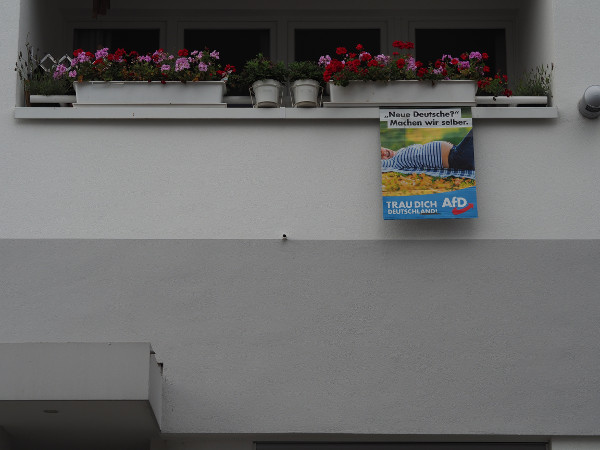Book Review: Jürgen Wiebicke – Ten Rules for to Rescue Democracy (2017)
(big thanks to google translator ↔ google Übersetzer, who has done more than 95 percent of translational work)
Read the Review in german: Die Demokratie wird im Alltag gerettet
The book „Ten Rules for to Rescue Democracy Savior“ (freely translated) by Jürgen Wiebicke is not voluminous with 112 pages, but its content is weighty. Because the book deals explicitly with recent political shifts and gives hints on how to handle them. It shows that moral indignation does not help and rather leads to the opposite. Which was made clear with the shift to the right in the last german general election (2017).
The starting point for this book, declared Wiebicke, was the election of Donald Trump as US President and the compelling question of how this could happen in a democracy. The rise of the german AfD puts you in front of the same question. The author gives clever answers to these questions and he has written the book to sharpen the sense for democracy of the next generation, „who must pay what we miss today“.
Democracy never is finished
Democracy is currently in danger because it has worked so well for so long. For more than two generations, democracy has in germany been perceived as a finished house by the majority of society, and it makes people feel comfortable in it. But – so Wiebicke – democracy is always unfinished, it always has to be worked on. Just as mathematics, grammar and photosynthesis need to be learned in school, even though all the answers are already known, so too must democracy be learned every generation anew. „He who does not know the past,“ a well-known saying, „is forced to repeat it“ (George Santayana). For democracy, one could say: whoever takes it for granted, is on the verge of losing it.
At this point of history Wiebicke understands the indifference of many people as the central problem. But there is also the feeling of powerlessness of the individual, Wiebicke speaks of „lack of self-efficacy“. It is the feeling of being „driven instead of being able to create something“. Everything goes so fast, you do not have time to think and whatever you do, nothing seems to change. This diffuse emotional state of powerlessness is currently culminating in a lesson for the established parties and the media, as their weak leadership leads to this situation. It should be noted that the high number of electoral votes for the AfD does not necessarily show that there are many people who think right wing, but that there are many people who want an alternative to the established policy. It is more lack of trust in politics and less right thinking.
At the same time, the wish to save democracy is uqual to the desire to save this society: „For everything that has to be criticized in this society – there has not been a better one historically.“
What‘s to be done for rescue
Being passive just opens spaces for the few who despise democracy. You have to become active, do somithing and do it for starters on a small scale. Because on a small scale, one can best rediscover one’s own self-efficacy. This includes being involved in the neighborhood, enhancing it together, getting to know each other. „Love your city“ is the first and most important of the ten rules. Having one’s own city or district as a starting point for change has several advantages.
First, successes become more visible, as one’s own quality of life increases and thus one then experiences oneself as self-effective. Simply starting is one thing, finding a project of the right size is the other. Accordingly, the book names the second chapter: „Make the world to the village“. This chapter is about „how important personal relationships are for successful action.“ If something is to change in one’s own neighborhood, then this can only be done together. Wiebicke goes so far as to say that the relationship is initially more important than the actual project. The network must be sustainable and only then should a problem be tackled. „Local democracy, if it is to be renewed from below, needs sustainable structures to survive periods of fatigue“.
What to avoid
The following chapter takes a completely different direction: „Stay calm in dealing with democracy-despisers“. It refers directly to the AfD, but can be generalized. Democracy-despisers derive their energy from being insulted and vilified by others. That’s what makes them a solid group. Therefore one should ferbear from emotionalism and calmly meet people with little respect for democracy. It is not to offend, but to ask, what alternative do you have to offer?
This includes not losing touch with people who disagree (Chapter 5). Here, existing problems must not be concealed, even if they are such. The refugee problem is unpleasant, you have to address it at least (Chapter 6). Otherwise, the naming of the problems is left to the right wing and they name the problems in their own way.
Conclusion
All ten rules are well-chosen and well-founded, but it could as well only be eight or twelve rules. There are probably ten rules because it reminds of the 10 commandments of the Bible and sounds better on a book cover. But that is the only point on which the very successful book appeals. Everywhere else it is fact-based and passionately argued. If the book „Ten Rules for to Rescue Democracy“ points something out, then democracy can only be saved with commitment. Because – as an old political slogan says – who fights can loose, but who does not fight, has already lost. Everyone who does not get politically involved for democracy have already lost. If you want to save democracy, you have to stand up for it.
Ultimately, though, the book „Ten Rules for to Rescue Democracy“ can not explain how Donald Trump won the US presidential election. But it explains how we can strengthen democracy here on our own doorstep.



